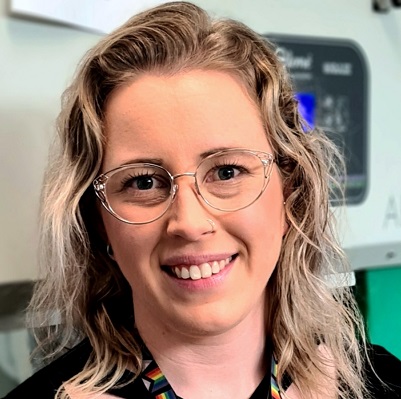
Jordan Clarke
‘Modelling Anatomical Phenotypes of Schizophrenia in Patient-Specific Cerebral Organoids’
University of Melbourne, Vic
Awarded 2023
Co-funded by the Jonathon Ceddia Memorial
“Research of this kind may also support other research into psychiatric conditions, broadening the scope and increasing the number of people it could benefit.”
Researcher Profile
Jordan completed her Master of Biomedical Science in 2017 from the University of Melbourne (UoM), where her project looked at utilising adult stem cells to prevent and treat heart failure in patients following myocardial infarction. Following this, she worked as a Junior Research Assistant at the Centre for Eye Research Australia, establishing induced pluripotent stem cell (iPSC) lines and optic cup organoids from patients with Primary Open Angle Glaucoma.
In 2019 she began work at the Walter & Eliza Hall Institute, Personalised Oncology Division, where she established colorectal cancer organoids from patients undergoing treatment, which were used in drug sensitivity assays to identify the optimal treatment options for an individual. Her work here resulted in a first author publication, primary inventorship on an international patent and a Kellaway Excellence Discovery Award for Outstanding Contributions to Translational Research. In 2022, she began working at the University of Melbourne in the Dept. of Psychiatry where she commenced her research on schizophrenia.
To date she has optimised and validated a protocol for generating iPSCs using blood from patients with schizophrenia and established over 50 stem cell lines as part of a collaboration with the Human Connectome Project – Early Psychosis.
Project Summary
Schizophrenia is a complex and debilitating psychiatric disorder with patients experiencing alterations in behaviour, speech, thought processes and perception. Due to the complexity of schizophrenia, the exact cause is still unknown. Current research indicates a combination of genetics and subtle changes in brain chemistry and structure are likely involved. Clinical neuroimaging data suggests that structural abnormalities exist in many regions of the brain when comparing images acquired from individuals with the disorder to healthy controls.
During my project, I will generate stem cells using blood drawn from patients with schizophrenia. These individual stem cell lines will be a genetic match for the person from which the original blood sample was taken. Using these patient-matched stem cells, I will grow ‘miniature brains’, known as cerebral organoids, from both healthy individuals and diagnosed patients. I will use the patient-specific organoids to study the structural brain changes seen in patients with schizophrenia, the role they play in the development of the disorder, and to further investigate the underlying mechanisms driving the brain abnormalities.
By increasing our understanding of the biological processes underlying schizophrenia, we can uncover new targets for treatments and ultimately improve the lives of the individuals and families living with the disorder.